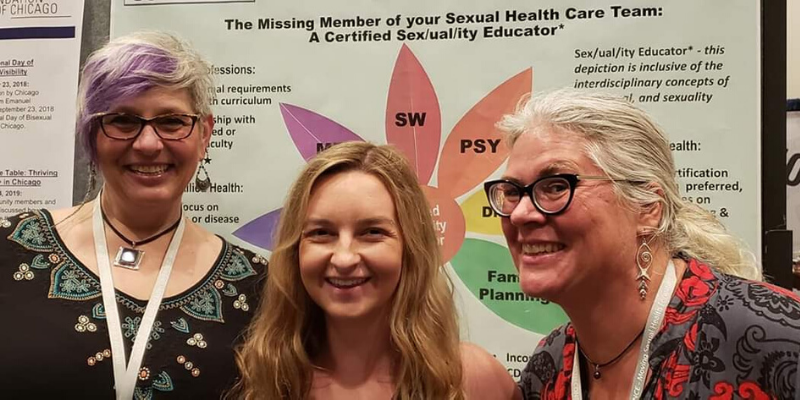Flourishing Miami Center Fills A Growing Demand for Sexuality Education


by James M. Loy, Miami University
When Dennis L. Carlson, a Miami University professor of educational leadership, began studying sex education and youth culture, he would eventually go on to literally write the book on the subject. Five of them, in fact, along with dozens of articles, essays, and chapters that ultimately secured his position as one of the most prolific and important researchers in the field.
Today, his legacy lives on through the Dennis L. Carlson Sexuality Education Studies Center (SESC), where a Naming Ceremony will honor his life and work.
“We’re scholars. But he's the scholar,” says Richelle Frabotta, SESC coordinator and AASECT
certified sexuality educator and supervisor. “He's the researcher and writer. And I'm the person that translates it and puts it into the street, forging community partnerships, and creating the programming and providing services. So the ceremony is a way to acknowledge both.”
Open to all members of the campus and the community, the ceremony will take place in McGuffey Hall on December 3 at 12:30pm. Along with remarks and refreshments, it will also highlight the vast array of programs and projects that the SESC now offers.
“The idea of delivering competent sexuality education services from a certified professional is getting around,” Frabotta says. “People are starving for this information. And what is great is that the SESC allows that type of in-community programming and education services to happen.”
Recently, the SESC secured several significant grants to provide a variety of services to a number of diverse groups across many different communities.
The largest comes from the Montgomery County Alcohol, Drug Addiction, and Mental Health Services (ADAMHS) in Dayton, Ohio, which provided nearly $90,000 to create a new position that will work directly with LGBTQ youth
In addition to facilitating the hiring process, Frabotta will help ADAMHS implement prevention education to decrease the health disparities affecting non-cisgender, non-heterosexually identified youth.
“That’s our ultimate goal, to help youth who identify in diverse and marginalized ways be healthier,” Frabotta says. “Because health disparities among this population are ridiculous. Off the charts. If any other population had the amount of health disparities that LGBTQ youth in particular are experiencing right now, there would be health alerts.”
Other SESC grants are also increasing Miami’s presence throughout the wider Dayton Miami Valley region, and even far beyond.
Funding from Dayton Montgomery County Public Health will allow Frabotta to deliver HIV-related prophylaxis information to several area organizations including the University of Dayton and Sinclair Community College. And additional contracts from the University of Oklahoma Center for Learning and Leadership and Oklahoma People First, Inc. will also help the SESC continue to provide sexuality education to people with developmental disabilities.
“I taught a parent seminar about sexuality education for youth with Down syndrome,” Frabotta says. And soon she plans to bring similar programming to Living Arrangements for the Developmentally Disabled (LADD, Inc.) and the YWCA in Cincinnati as well.
Furthermore, the SESC also just established a new partnership with Hamilton County Judge Heather Russell, a Miami alumna who runs the CHANGE Court program. CHANGE Court is a supervised treatment program for women involved with human trafficking, and now it plans to add healthy sexual relationship information to its list of support services.
According to Frabotta, this expanding list of partnerships and projects not only signals a deep need for more research-informed, medically accurate, developmentally relevant, and age-appropriate sexuality education to reach more people.
It also demonstrates the profound level of dedication and support the SESC continues to receive from Miami’s administration -- especially Dean Michael E. Dantley, says Frabotta -- as well as from Miami students and those across the region.
“I couldn't do any of this without students who are interested in this kind of work about being human,” she says. “And it's thriving because people really want to know more about how to connect and communicate about challenging topics. I'm able to provide services to diverse audiences because sexuality education is for everyone.”

